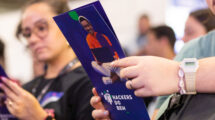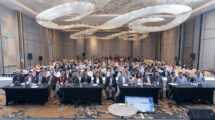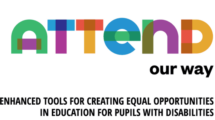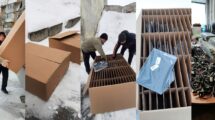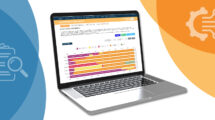CONNECT speaks with Kerrie Power, CEO of HEAnet, the Irish National Education and Research Network, to learn more about her vision for the future of HEAnet and its role in the European Open Science Cloud (EOSC).
What brought you to HEAnet?
HEAnet is unique in what it does in Ireland, I was attracted by its altruistic, ‘bigger than me’ mission. I had never worked for a publicly funded or not- for-profit organisation before and I do feel I am making a difference and doing something special for education and research in Ireland. When approached about the CEO role at HEAnet, I started researching the organisation and was very impressed by the talent within the organisation. For example, I reviewed some impressive talks given by remarkable colleagues such as Anna Wilson, who won this year’s GÉANT Community Award at TNC19. These talks reflected a strong passion for technology which I thought were incredibly interesting and exciting. I love to work with people who are passionate in what they do, focussed on meaningful outcomes – this is an environment where I felt I could add value and learn. This is why HEAnet was a perfect fit for me.
In your first two years as CEO, what are you most proud of?
There are so many moments to be proud of, the very first one was becoming CEO of HEAnet! To take the reins and drive the organisation from a foundation of strength was such a proud moment. I inherited a great company from my predecessor John Boland who had established a strong relationship with the NREN community. I am also proud of the core competencies we have developed in the areas of security, connectivity, identity and brokerage and how we leverage these competencies as an effective shared service for the benefit of the education sector in Ireland; in other words, delivering common repeatable shareable solutions for all of education. We are different from many NRENs in Europe in that we support primary and secondary education as well as higher education. This gives us a great opportunity to make an impact across all of education.
We are building on our key stakeholder engagements and aligning with Ireland’s National Shared Services Strategy where we are being asked to do more. I am delighted to see HEAnet at the decision-making tables, being involved in more strategic conversations with Government and other key stakeholders: this is really important to us and we need to continue to build these relationships. When I joined the organisation two years ago, I took the opportunity to take stock of what we had collectively been doing well and consider what improvements were necessary to be more effective and become more agile. HEAnet was incorporated over 20 years ago, so it was appropriate to align the organisation with newer ways of working. In my first year, I observed, listened, and encouraged the team to share their views. We then embarked on an organisation realignment, removing hierarchy and encouraging an open culture of collaboration and transparency. One of our key achievements has been to empower people to make decisions and change how we communicate by removing barriers and obstacles to getting things done. In essence, being a lot more agile in our approach. We also created a new function, ‘Strategy, Research & Development’ that is focussed on exploring new opportunities and technological developments to support the research and education community in Ireland. It is headed up by our Chief Strategy Officer, Ronan Byrne, who is actively involved with GÉANT and the wider NREN community.
This is a very exciting opportunity for us, as we never had a group dedicated to horizon scanning prior to this, with the objective of evaluating new service opportunities and partnerships. I am excited by the potential of this area. I am fortunate to take on a well-functioning team with whom I believe I can make meaningful impact and change. I believe we are well positioned for the future.
What is HEAnet’s view on EOSC and how is HEAnet involved?
EOSC presents the opportunity to progress an open research agenda for Ireland. HEAnet is focussed on how to facilitate EOSC and how it best delivers on this national ambition. Open research has the potential to transform the research landscape. The EOSC will offer 1.7 million European researchers and 70 million professionals in science, technology, the humanities and social sciences a virtual environment with open and seamless services for storage, management, analysis and re-use of research data, across borders and scientific disciplines by federating existing scientific data infrastructures, currently dispersed across disciplines and the EU Member States. We have a privileged place on the EOSC Governance Board thanks to our nomination by the Department of Business Enterprise and Innovation here in Ireland. This allows us to represent the needs of Irish researchers while also progressing a collective European objective. EOSC has the potential for brilliant outcomes and enables us to solve real-world issues and grand challenges.
Europe can lead the way in showing what can be achieved when we truly enable the sharing of research by collectively bringing our strengths together. NRENs have always shown the value of working together – we are the conduit to local experiences, local challenges and local knowledge, and we need to leverage that to collectively meet the needs of EOSC. I think that GÉANT is in a unique position to support this in the future and I very much encourage its involvement in EOSC.
Why is GÉANT important for HEAnet?
We view our relationship with GÉANT as being mutually beneficial and we consider GÉANT a key partner in supporting us in the development of our strategic themes: Connectivity, Security, Identity and Brokerage. GÉANT is our connectivity bridge to Europe and the rest of the world, but also a provider of other critical services, such as eduroam and eduGAIN. Brokerage of Cloud IaaS is also extremely valuable for us as it delivers real value for our client members who benefit from cost effective cloud pricing and superior service levels. The collaborative efforts of GÉANT are also very important to us and reflect the collective strengths of NRENs working together. HEAnet consistently commits resources across a range of GÉANT projects and task forces. We embrace GÉANT’s knowledge sharing principles, their ‘bigger picture’ and ‘looking over the horizon’ vision, thinking and approach.
How do you feel your commercial background (Google etc.) helps you in the GÉANT community?
I have been very fortunate to have such a broad career experience in technology. This has helped to support my role at HEAnet by enabling me to utilise and adapt the skills acquired in the commercial arena to the NREN, not-for- profit world. One of the big differences between the two environments is the pace of change. Unlike what happens in very agile and fast-paced multinational organisations, I have found the pace of change is slower, but can achieve greater levels of collaboration and motivation where both environments complement each other well.
What is your vision of the future for HEAnet and for GÉANT?
The future is exciting! Our strategic vision is to enable Ireland’s digital ambition and to make real positive impact. HEAnet will be increasingly more strategic in its thinking in relation to education technology and shared services for Ireland. Like GÉANT, we are diverse, have many strengths and are geared up to face the future. We believe there are great opportunities to bring our collective strengths together and utilise our core competencies working closely with GÉANT, particularly in Cloud Brokerage and EOSC. The future is exciting for HEAnet, but moreover our entire community.
Kerrie, tell us a bit about yourself
Everyone at HEAnet knows that my biggest obsession is my dog, Milly. As a rescue dog who had been abandoned and treated cruelly, she was in a very poor state when she came to us. I have seen her flourish, grow and become a therapy dog (now retired); she has such a gentle temperament and a very loving and caring nature. I also enjoy playing badminton and this year I proudly represented Ireland in the female doubles at the European Gay Games in Rome, where we won bronze! I look forward to surpassing this result at the 2020 games in Dusseldorf.


